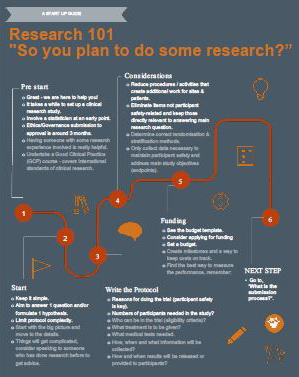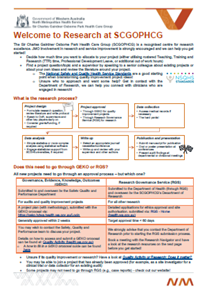Research 101
Pre start
- Great - we are here to help you!
- It takes a while to set up a clinical research study
- Involve a statistician at an early point
- Ethics / Governance submission to approval is around 3 months
- Having someone with some research experience is really helpful
- Undertake a Good Clinical Practice (GCP) course - em>covers international standards of clinical research.
International Conference on Harmonisation Good Clinical Practice (ICH-GCP) certificate [every 3 years]
You are expected to undertake GCP training/certification before embarking on clinical research (in some countries GCP training is mandatory). GCP training describes the international standards and specific responsibilities of investigators (principal and coordinating), sponsors, monitors, and ethics boards in carrying out the good conduct of clinical trials. GCP training aims to ensure that the rights, safety, and well-being of human subjects are protected and that clinical trials are conducted with rigour and integrity in accordance with ethical and institutional approvals.
GCP training can either be done through a physical course:
- free online (for WA Health staff) at Research Education and Training Program (RETPROGRAM) (external site)
- If other GCP training is undertaken as there are many available courses, please ensure that the minimum criteria for GCP training of investigators and site personnel, based upon ICH E6 R2 (PDF), is covered.
Start
- Keep it simple
- Aim to answer 1 question and / or formulate 1 hypothesis
- Limit protocol complexity
- Start with the big picture and move to the details
- Things will get complicated, consider speaking to someone who has done research before to get advice.
Write the Protocol
- Reasons for doing the trial (participant safety is key)
- Numbers of participants needed in the study?
- Who can be in the trial (eligibility criteria)?
- What treatment is to be given?
- What medical tests needed
- How, when and what information will be collected?
- How and when results will be released or provided to participants?
Considerations
- Reduce procedures / activities that create additional work for sites and patients
- Eliminate items not participant safety-related and keep those directly relevant to answering main research questions
- Determine correct randomisation and stratification methods
- Only collect data necessary to maintain participant safety and address main study objectives (endpoints)
Funding
- See the budget template
- Consider applying for funding
- Set a budget
- Create milestones and a way to keep costs on track
- Find the best way to measure the performance, remember: If not measurable, it can't be improved.
RGS
- Research 101 "So you plan to do some research? infographic (PDF)
- JMO Onboarding Research Guide (PDF)
- Go to ‘What is RGS?’ (external site)



